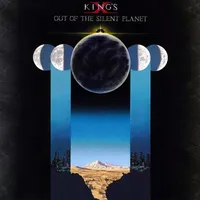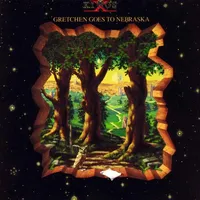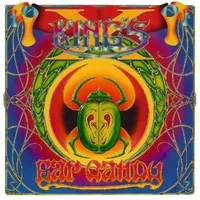The King's X albums you should definitely own
Enigmatic trio King's X have never quite enjoyed the success they deserved, but they've made excellent music along the way – and these are their best albums

Select the newsletters you’d like to receive. Then, add your email to sign up.
You are now subscribed
Your newsletter sign-up was successful
Want to add more newsletters?

Every Friday
Louder
Louder’s weekly newsletter is jam-packed with the team’s personal highlights from the last seven days, including features, breaking news, reviews and tons of juicy exclusives from the world of alternative music.

Every Friday
Classic Rock
The Classic Rock newsletter is an essential read for the discerning rock fan. Every week we bring you the news, reviews and the very best features and interviews from our extensive archive. Written by rock fans for rock fans.

Every Friday
Metal Hammer
For the last four decades Metal Hammer has been the world’s greatest metal magazine. Created by metalheads for metalheads, ‘Hammer takes you behind the scenes, closer to the action, and nearer to the bands that you love the most.

Every Friday
Prog
The Prog newsletter brings you the very best of Prog Magazine and our website, every Friday. We'll deliver you the very latest news from the Prog universe, informative features and archive material from Prog’s impressive vault.
King’s X are the perfect example of the unstoppable force of musical brilliance meeting the immovable object that is public apathy. As unique as they are celebrated, neither the critical acclaim that greeted them when they emerged with their glorious debut album, Out Of The Silent Planet, in 1988 nor the small but devoted following they’ve amassed has ever translated into anything remotely approaching mainstream success.
The Missouri-by-way-of-Houston trio of bassist/vocalist dUg (formerly plain old Doug) Pinnick, guitarist/vocalist Ty Tabor and drummer/vocalist Jerry Gaskill had been playing together for a decade when they released that debut (Pinnick was already approaching 40). They wedded the amped-up dynamics of a classic power trio to Sgt Pepper-era Beatles harmonies, while Pearl Jam bassist Jeff Ament once declared that they invented grunge on account of Ty Tabor adopting a throaty, drop-D tuning long before anyone else (PJ weren’t the only Seattle band to acknowledge their greatness – Alice In Chains’ Layne Staley and Jerry Cantrell were avowed fans too).
The press quickly picked up on the fact that King’s X had emerged from the Christian music scene and that their faith seemed to be embedded in their DNA – something which set them apart but also counted against them in the Sodom and Gomorrah that was the late 80s rock scene. The trio pushed back against the ‘Christian band’ tag, not entirely convincingly. It’s difficult to deny you’re a religious band when there’s literally a cross in your name.
That initial media buzz carried on for a few years, but a lack of chart success and split from manager/producer Sam Taylor, who helped shape those initial records, saw them almost dashed on the rocks of a music industry that never truly knew what to do with them. There have been plenty of testing times since – all the members have distanced themselves from Christianity to varying degrees, dUg Pinnick came out as gay in the late 1990s to a predictable backlash from sections of the fanbase, and Jerry Gaskill suffered two serious heart attacks in the last decade. The band themselves have seemed studio-shy at times – 2022’s Three Sides Of One was their first album in 14 years.
Thankfully they’ve persevered, and today their place as one of the great cult bands of the last 40 years is well cemented. Success is fleeting, but greatness endures.

Out Of The Silent Planet (Megaforce, 1988)
One of the great debuts of the 1980s, Out Of The Silent Planet was simultaneously muscular, heavy, delicate and devotional. The decade they’d spent playing together had served them well, with Tabor’s guitar alternately jagged and ornate as it twisted around Pinnick’s metallic 12-string bass, sounding way more powerful than any threepiece had a right to sound.
Hard rock anthems In The New Age, Power Of Love and King were self-consciously Big Music, evoking early 80s U2 in their quest for spiritual connection if not in sound, but it’s the aching hymn to unrequited love Goldilox that proved how special they were.
Gretchen Goes To Nebraska (Megaforce, 1989)
The trio’s second album took everything they’d achieved on that stellar debut and blew it wide open. From its enigmatic, evocative title – taken from a short story written by Gaskill – down, Gretchen Goes To Nebraska takes in everything from hard rock to Beatles-y pop to the gospel music that Pinnick had been weaned on.
Confusingly-titled opener Out Of The Silent Planet, Over My Head’s elemental soul power and Goldilox sequel-sort-of Summerland are obvious highlights, while Tabor’s coruscating Pleiades – inspired by heretical 17th century philosopher Giordano Bruno – is one of the great overlooked King’s X gems.
Faith Hope Love (Megaforce, 1994)
The band’s attempts to distance themselves from the ‘are they/ aren’t they a Christian band’ narrative wasn’t helped by the title of their third album. But Faith Hope Love otherwise saw them pulling away from the musical template they’d followed on their first two albums, heavying things up significantly on the aptly-titled We Are Finding Who We Are and exhilarating single It’s Love, and going even more psychedelic on Mr Wilson and Six Broken Soldiers.
At 60 minutes it’s 10 minutes too long, though the only truly grating note is Tabor’s Legal Kill, whose gentle ambience seems to mask a queasy, if ambiguous anti-abortion message.
Four albums in and the wideeyed wonder that had defined King’s X’s early days was evaporating, replaced by a more hard-bitten edge. Their final collaboration with mentor-manager Sam Taylor still featured its share of celestial melodies and heavenly harmonies – The Big Picture’s eyes-to-the-skies exultations, Lost In Germany’s dual Pinnick/ Tabor vocals, the sitar-led highpoint Not Just For The Dead – but it was marked by tougher moments such as Black Flag and the grinding Ooh Song.
With hindsight, it represents a tug of war between the band they were and the band they’d become.
Dogman made the connection between King’s X and grunge explicit. After splitting from Sam Taylor, they hooked up with Pearl Jam producer Brendan O’Brien and delivered the heaviest album of their career.
Powered by a truly monstrous bass sound and stripped of the prettiness that marked their earlier albums, it takes a scorched earth approach musically and lyrically: there’s little respite from the volume (notably, Tabor doesn’t take a single lead vocal), while Pinnick expresses his growing disillusion with Christianity, not least on the 51-second hardcore blast Go To Hell. A testing album, but a rewarding one.
This unjustly overlooked sixth album was a step back towards their old sound after the grunge-adjacent heaviosity of Dogman. Tabor’s Mississippi Moon is a lovely psychedelic pop gem, while A Box throws in those familiar chiming melodies and gorgeous harmonies.
But a sense of flux surrounded it: Pinnick was wrestling with both his sexuality and pretty much done with his faith, as illustrated by his mournful declaration that ‘religion burned me at the stake’ on the Looking For Love, while they were reaching the end of their time on Atlantic. The most under-appreciated album in a career full of them.
Their first album for their new label Metal Blade was framed by Pinnick’s public revelation that he was gay, losing them a large chunk of their Christian audience but giving him personal liberation.
Musically, Tape Head set the pattern for many of the albums that followed: flashes of transcendence amid music that was unique by other bands’ standards but merely solid by King X’s own. In the former camp are Tabor’s Beatles-y Ocean, Pinnick’s pleading Little Bit Of Soul and the charged Higher Than God. Still, the less said about the dirgey Mr Evil and the pointless closing jam Walter Bela Farkas (Live In Peace New York) the better.
Please Come Home… Mr Bulbous (Metal Blade, 2000)
If Ear Candy is the trio’s most undervalued album, then their first record of the new millennium is their most divisive, with much of fans’ opprobrium aimed at that admittedly godawful title.
But for ‘divisive’ read ‘experimental’ - opening song Fish Bowl Man kicks off with a snare drum rattle that predates St Anger by three years before swinging between wilfully grating chug and blossoming chorus, while Charlie Sheen’s jangling progadelica and the muttered malevolence of Smudge are the sound of a band pushing at its own boundaries. They retreated back to safer ground soon after.
Three Sides Of One (InsideOut, 2022)
Kings X’s first album in 14 years was fuelled by a generous amount of pent up energy. Howling opening track Let It Rain, the billowing Nothing But The Truth and Tabor’s lilting, lovely Take The Time find the band rolling back the years, while Flood Pt.1 sees a quietly seething Pinnick once more casting a jaundiced apostate’s eye over humanity: ‘I used to say that all we need is love,’ he sings. ‘Now I’m think that what we need is a flood.’
With Tabor and Gaskill now in their sixties and Pinnick in his seventies, Three Sides Of One could be their final album. If it is, it’s a fine full stop.
...and one to avoid
You can trust Louder
Manic Moonlight (Metal Blade, 2001)
The familiar caveat applies: King’s X have never made a truly bad album, they’ve just made less good ones. And Manic Moonlight is the least good.
Perhaps they were running out of juice after 20 years of largely rewardless effort, or maybe they were distracted by the various side-projects they’d launched (Pinnick’s Poundhound, Tabor’s Jughead and prog trio The Jelly Jam), but funk rock plodder Believe and directionless wah-wah jam Skeptical Winds don’t add anything to their legacy, while various square-peg electronic effects can’t paper over the cracks. The powerful Jenna is the album’s one keeper.
Sign up below to get the latest from Classic Rock, plus exclusive special offers, direct to your inbox!
Dave Everley has been writing about and occasionally humming along to music since the early 90s. During that time, he has been Deputy Editor on Kerrang! and Classic Rock, Associate Editor on Q magazine and staff writer/tea boy on Raw, not necessarily in that order. He has written for Metal Hammer, Louder, Prog, the Observer, Select, Mojo, the Evening Standard and the totally legendary Ultrakill. He is still waiting for Billy Gibbons to send him a bottle of hot sauce he was promised several years ago.











